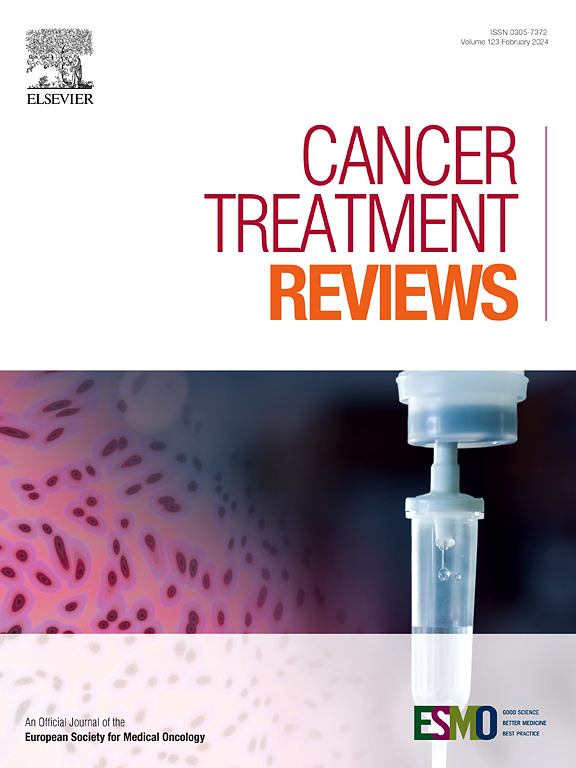专家对辅助免疫治疗后肾癌进展模式和后续治疗策略的共识
IF 10.5
1区 医学
Q1 ONCOLOGY
引用次数: 0
摘要
自辅助药物派姆单抗获批以来,免疫疗法改变了局部透明细胞肾细胞癌(ccRCC)的治疗方法,在中高复发风险患者的无病生存期(DFS)和总生存期(OS)有显著改善。这种新方法影响局部治疗后复发的患者以及辅助派姆单抗期间或之后的救援策略。然而,目前还没有强有力的科学证据表明在这种临床情况下的治疗决策,这代表了一个进一步辩论和研究的领域。在这篇文章中,泌尿生殖研究与发展联盟(GUARD)的一组专家回顾了现有的科学证据,为免疫治疗辅助治疗后进展的ccRCC患者的治疗决策奠定了基础。尽管在这种情况下缺乏随机临床试验,但该专家组建议根据复发量(少转移vs多转移)、复发时间和某些分子特征对患者进行分类。复发后的抢救治疗应个体化,可能包括局部治疗,如手术或放疗,以及对免疫治疗有耐药性的患者进行抗血管生成治疗。本文章由计算机程序翻译,如有差异,请以英文原文为准。

Expert consensus on patterns of progression in kidney cancer after adjuvant immunotherapy and subsequent treatment strategies
Immunotherapy has changed the management of localized clear cell renal cell carcinoma (ccRCC) since the approval of adjuvant pembrolizumab, which demonstrated significant improvements in disease-free survival (DFS) and overall survival (OS) in patients at intermediate and high risk of recurrence. This new approach impacts rescue strategies in patients who relapse after local treatment and during or after adjuvant pembrolizumab. Nevertheless, there is currently no robust scientific evidence on therapeutic decision-making in this clinical situation, representing an area for further debate and research.
In this article, a group of experts from the Genitourinary Alliance for Research and Development (GUARD) have reviewed the available scientific evidence to establish the basis for therapeutic decision-making in patients with ccRCC who progress after adjuvant treatment with immunotherapy. Despite the lack of randomized clinical trials in this setting, this group of experts recommends classifying patients according to relapse volume (oligometastatic vs. polymetastatic), time to relapse and certain molecular characteristics. Rescue treatments beyond relapse should be individualized and might include locoregional treatments such as surgery or radiotherapy as well as antiangiogenic therapies in patients defined as resistant to immunotherapy.
求助全文
通过发布文献求助,成功后即可免费获取论文全文。
去求助
来源期刊

Cancer treatment reviews
医学-肿瘤学
CiteScore
21.40
自引率
0.80%
发文量
109
审稿时长
13 days
期刊介绍:
Cancer Treatment Reviews
Journal Overview:
International journal focused on developments in cancer treatment research
Publishes state-of-the-art, authoritative reviews to keep clinicians and researchers informed
Regular Sections in Each Issue:
Comments on Controversy
Tumor Reviews
Anti-tumor Treatments
New Drugs
Complications of Treatment
General and Supportive Care
Laboratory/Clinic Interface
Submission and Editorial System:
Online submission and editorial system for Cancer Treatment Reviews
 求助内容:
求助内容: 应助结果提醒方式:
应助结果提醒方式:


